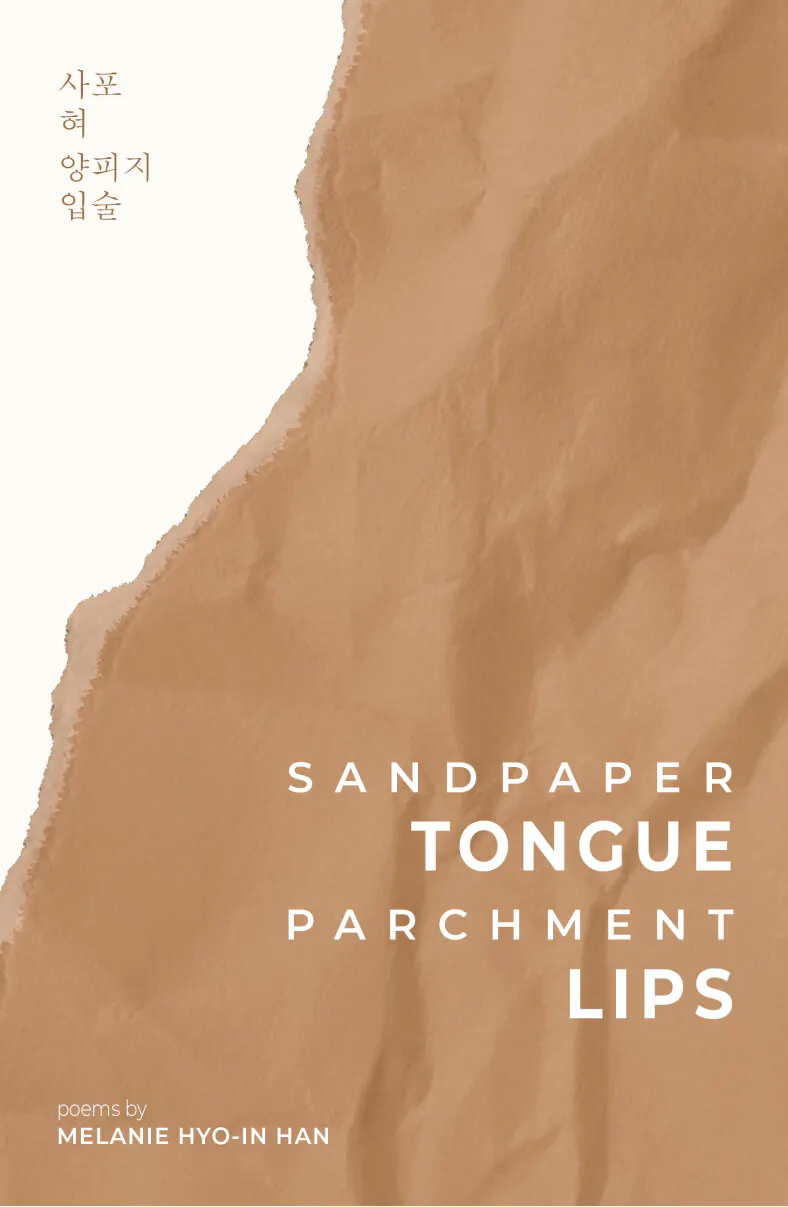Published November 22nd, 2021
Review
by Matic Ačko
Through the scattered, yet vivid poems of Sandpaper Tongue, Parchment Lips, Melanie Hyo-In Han tells the story of being a young girl belonging to multiple cultures in a world that always seems to favour someone else, of harsh and sandy and distant places that you know but never really feel like home. Underneath it all, this collection of poems is a testament to enduring all of this within your own fragmented personality because it is the only way you win in the end.
Reading these poems as someone who grew up in a small European town, they felt immensely foreign at first. The lands and the people they paint felt as distant as they possibly could to me, probably because we are used to watching scenes of African deserts and Far Eastern cities through the filter of television, from a safe distance of thousands of miles. But then at some point my perspective suddenly shifted. I felt as if I knew this girl. This story is told by a real person whom I met through these poems and, through the reading experience, suddenly this is not a distant, unrelated narrative anymore. This is how Hyo-In’s poetry gets to you. You’re just an observer at first, and then suddenly, you are friends.

Melanie Hyo-In Han was born in South Korea and raised in South Africa. She now lives in Boston, but has — as we learn throughout her poetic journey in Sandpaper Tongue, Parchment Lips — lived in many places in between. The homepage on her website (https://melaniehan.com) tells us that she is a writer, a traveller and an educator. She has degrees in English and Spanish as well as in literature and translation. Her work has been awarded prizes by “Boston in 100 Words” and The Lyric Magazine, it has been nominated for a Pushcart Prize, and it has been printed in numerous publications, including the essay “My Dear Yeast” published in the Fall ’20 issue of Tint Journal. Sandpaper Tongue, Parchment Lips is her first poetry collection.
The collection, written by a remarkable human being who has probably seen and been through more than most of us, is built upon a central experience: displacement. Displacement on multiple levels, to be exact. Immersed into the poems we follow the author through flashing scenes of childhood memories that defined her. Some take young Hyo-In back to Tanzania, others portray her in places we cannot name or define, but wherever she is, we can sense she doesn’t feel like she belongs there. She is a foreigner wherever she goes. Her hair or her skin tone don’t match that of those around her; the food her mother makes disgusts other children; teachers can’t pronounce her name. Yet still these experiences, while involuntarily defining her, are some of the least traumatic things she’s endured.
Claiming that the collection deals only with feelings of alienation caused by immigration and cultural differences does not do it justice. The broader, global undertone of the narrative is intricately intertwined with intimate personal experiences and issues. Her personal traumas have displaced her mentally and emotionally. Even within the closest circle of her family, things tend to fall out of place. As she struggles to establish her identity in the world, she deals with her mother’s severe illness, with sexual abuse and domestic violence, suicide, death, and fragile relationships. The struggle of being a foreigner and of living in a third world land meets the struggle of being a woman, while existing in a system that favours neither of these conditions.
Adapting to constant change makes one grow shallow roots and nervous feet. Just as her childhood seems foreign to those of us who have spent most of our lives in the same safe place, our lives seem odd and alien to her:
“And maybe that’s why we had to end our relationship
I was a home to you, but you were just a house to me,”
she explains to someone who’s lived in the same house for so long they know the exact shape of the burn mark on the left side of their fridge.

The language of the poems is relatively simple so that the content is easily accessible to the reader. The poetry is very narrative. Hyo-In speaks of real experiences and doesn’t hide much, being very direct in places where she needs to be. Sandpaper Tongue, Parchment Lips does not feel like a systematic, thoroughly planned collection; it almost feels as if one might be reading impressions written on a sand-stained napkin somewhere under an acacia tree or in a hospital waiting room, and this is no accident. This is what the collection aims to be — true to itself and the author’s experience through content and form, a series of memories and impressions of a girl always on the move, always looking for home and for herself. Reflecting all these levels of displacement, the very words and the verses of the poems seem to be scattered across the paper, while naturally falling back into a structure every now and then. The form of the poems also varies as we jump through time and space. They are in no particular chronological order, either — rather, they are sequenced according to other measures of significance. The book opens with a scene of a terrible drought and finishes with what is probably one of the author’s earliest childhood memories. In contrast with most of the other poems, this last one is very light, offering us a strange tranquillity and an undefinable, yet tangible hope.
Despite their being chronically displaced and broken into pieces more than once, through these bits of poetry, Hyo-In delivers a strong message of persuasion and endurance. As readers, we follow her through trauma, hardship and pain, but then, there she is on her website, smiling whole-heartedly and unapologetically. Despite everything, she has endured and survived and she has seen the world and has cast her experiences into art that speaks to all of us. Sandpaper Tongue, Parchment Lips is an homage to making a home wherever you are with however little you have, of being a stubborn fighter in a disadvantaged position and, despite everything, making it. I would strongly suggest anyone with stubborn feet and a restless heart to read the book and let it take you on a very unique journey from Africa to Korea to the West and back again.
Nationality: Slovenian
First Language(s): Slovenian
Second Language(s):
English
Supported by:


Comments on "Growing Up Through Trauma and Deep Displacement — A Review of "Sandpaper Tongue, Parchment Lips" by Melanie Hyo-In Han"
Please log in to submit a comment.
Login